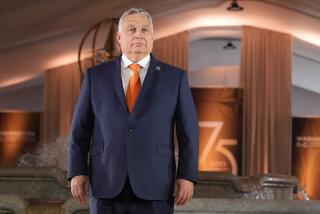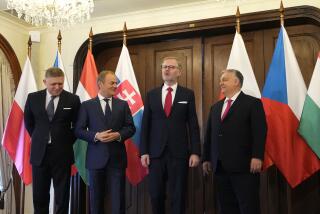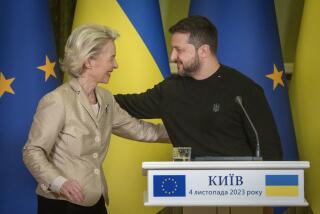European Union efforts in Central Asia have lagged, experts say
- Share via
Even as the European Union reached out to the East this week, sending its foreign affairs chief touring through Kyrgyzstan, Uzbekistan, Tajikistan and Kazakhstan for a string of meetings marked with smiling photos and words of goodwill, experts say its influence there remains muddled.
The EU set forth a strategy for Central Asia five years ago that covers practical matters, such as halting heroin smuggling and finding new, diversified sources of energy for Europe, to more idealistic goals, such as improving human rights and fostering democracy.
EU foreign policy chief Catherine Ashton struck those themes in Kyrgyzstan, saying the bloc “recognizes the importance of this region.”
But so far, experts say, the EU has little to show for the strategy, especially when it comes to the thorny matter of spurring reform in heavily autocratic states.
“The strategy was launched to great fanfare” when Germany held the presidency of the EU, said Raffaello Pantucci, a visiting scholar at the Shanghai Academy of Social Sciences. “Then the presidency shifted and interest sort of lagged. They haven’t made a huge amount of progress.”
The former Soviet republics wedged between Russia and China are routinely cited by human rights watchdogs for government repression. The nonprofit Freedom House rates almost all of them as “not free,” ranking Turkmenistan and Uzbekistan among the “worst of the worst.”
The landlocked region is often overlooked in terms of international strategy, save for its closeness to Afghanistan as Western forces there prepare to withdraw. There could indeed be a growing threat to regional security as troops pull out of Afghanistan, said Jos Boonstra, senior researcher at the FRIDE think tank in Spain.
“But we believe it’s not the main issue,” Boonstra said. “Central Asia has a lot of security threats in which Afghanistan doesn’t play any role. Maybe the biggest threat is the regimes themselves.”
Boonstra rattled off a long list of woes: Corruption. Authoritarianism. Shoddy education. The aging of some of the region’s most firmly entrenched leaders adds an element of uncertainty.
“There’s a whole host of issues that could maybe lead to something like an ‘Arab Spring,’ ” Boonstra said.
The EU says it presses those issues in Central Asia. But activists say there are too few consequences for those who run roughshod over human rights. Hugh Williamson of Human Rights Watch said that removing sanctions on Uzbekistan in favor of “quiet diplomacy” had been counterproductive.
“Commercial relations, energy links -- and one could add military cooperation regarding Afghanistan -- have decisively pushed human rights issues down, if not off, the EU’s agenda,” Williamson wrote in the European Voice.
Because the European Union is a relatively small player in the area, however, some experts say it has only limited sway in pushing for change.
“The EU cannot offer membership to the Central Asian states. It is not likely to completely open its markets” -- and even if it did, those nations’ goods might not fare well in Europe, said Aijan Sharshenova, a Central Asia researcher at the University of Leeds.
“Not having these two powerful leverages -- EU membership and trade -- it’s quite difficult to convince Central Asian states to cooperate on human rights and good governance,” Sharshenova said.
And Central Asian nations have other players to engage with besides the Europeans: China has been far more aggressive than Europe in pouring investment into the region, Pantucci said. It has built roads to cut travel times from days to hours. It has laid pipelines into the vast natural gas fields of Turkmenistan.
Still, the EU is seen as a model for many Central Asian states that admire its higher standard of living, Pantucci said -- and it could gain even more appeal as China grows in influence.
“It used to be Russia was the only power in town. Now China is increasingly the most consequential power in the region. That has concerned a lot of people,” Pantucci said. “To have the EU as another partner in the discussion is something that they appreciate.”
Pushing them hard on human rights, however, is something they probably won’t appreciate – one reason that Ashton may have been relatively subdued in her public remarks in Kazakhstan and Uzbekistan on the nations’ tainted human rights records.
“On the one hand, it’s valuable for the EU to encourage political reform,” Sharshenova said. “On the other hand, if they push harder, they might simply be kicked out of the region.”
ALSO:
Health officials warn of increasing HIV infections in Greece
Law enhances Chinese police’s power in disputed South China Sea
Israel announces plans for 3,000 more housing units in West Bank
More to Read
Sign up for Essential California
The most important California stories and recommendations in your inbox every morning.
You may occasionally receive promotional content from the Los Angeles Times.













